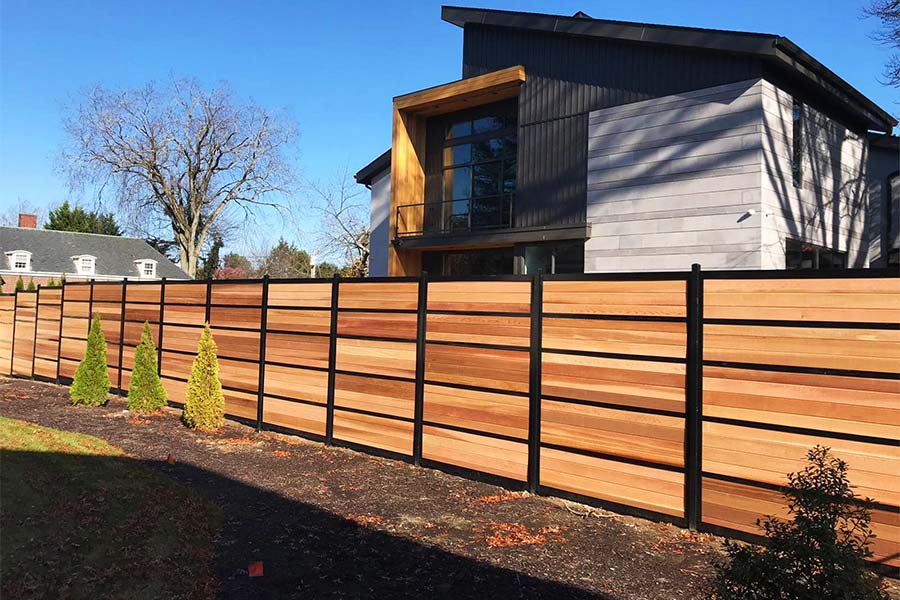Featured

When mounting a fencing, picking the right product is crucial to balancing capability, aesthetics, and spending plan. Timber, vinyl, and light weight aluminum are amongst the most frequently picked fencing products, each with its strengths and downsides. This overview checks out the benefits and drawbacks of these alternatives to assist you make an educated choice.

Timber Secure Fencing. Pros:. All-natural Beauty: Wood's ageless appeal can enhance any property with its warm and traditional appearance. Customizable: You can repaint, stain, or sculpt wood to fit your design preferences. Affordable: Timber secure fencing is originally a lot more affordable compared to a few other products. Eco-friendly: As an eco-friendly resource, timber is eco-friendly and typically taken into consideration green. Cons:. Maintenance-Intensive: Regular sealing, paint, or discoloration is called for to avoid damage from weather and insects. Prone to Degeneration: Without correct care, wood can rot, warp, or crack in time. Much shorter Lifespan: Generally, timber fences last 10-15 years, depending upon the kind of timber and upkeep. Timber is a fantastic alternative for those who value appearances and want to spend in routine maintenance to preserve its appearance and sturdiness.
Vinyl Fence. Pros:. Low Maintenance: Vinyl calls for minimal care-- just periodic cleaning with soap and water. Weather condition Resistant: It doesn't warp, rot, or catch insect damages, making it extremely sturdy in different climates. Durability: Plastic fencings can last 20-30 years with little to no repair services. Layout Variety: Available in a variety of appearances, styles, and shades, including wood-like looks. Disadvantages:. Greater Initial Expense: Plastic fencings are much more costly ahead of time contrasted to wood. Vulnerability to Cold: In incredibly winter, plastic can end up being breakable and vulnerable to cracking. Minimal Repair Options: Matching substitute panels can be testing if damage takes place. Plastic fencing is ideal for house owners trying to find a durable, low-maintenance solution that provides contemporary versatility.

Light Weight Aluminum Fencing. Pros:. Rust-Proof: Aluminum stands up to corrosion, making it an excellent selection for damp or damp settings. Long lasting: Despite being light-weight, aluminum is strong and can hold up against harsh weather problems. Reduced Upkeep: It needs marginal maintenance, commonly just periodic cleansing. Long Life-span: Aluminum fencings can last years without significant deterioration. Stylish Layout: Often used for ornamental functions, light weight aluminum fencing includes a streamlined, sophisticated seek to residential or commercial properties. Cons:. High Initial Investment: Aluminum fencings are amongst the costlier options on the market. Less Privacy: The open styles typical with light weight aluminum fencing do not supply much privacy. Vulnerable to Damages: While resilient, aluminum can dent if struck with adequate force. Light weight aluminum is a superb choice for home owners prioritizing visual appeals and resilience without requiring much upkeep.
Making Your Decision. When determining in between plastic, aluminum, or timber fence, consider your priorities:
Timber suits those that value a natural look and do not mind placing in upkeep effort. Plastic is the finest alternative for those seeking a low-maintenance, weather-resistant service. Light weight aluminum uses sleek style and lasting resilience however might do not have privacy. By thoroughly evaluating these materials' functions, you can choose a fencing that enhances your building while satisfying your aesthetic and functional needs.
Latest Posts
Learn About Oil Changes & More: Full Services Guide from Montclare Auto Repair
Published en
1 min read
Discover Special Auto Repair Specials in Chicago at Montclare Auto Repair
Published en
1 min read
Discover Montclare Auto Repair’s Highly Requested Car Care Solutions and Why Drivers Rely On Them
Published en
1 min read
More
Latest Posts
Learn About Oil Changes & More: Full Services Guide from Montclare Auto Repair
Published May 28, 25
1 min read
Discover Special Auto Repair Specials in Chicago at Montclare Auto Repair
Published May 26, 25
1 min read
Discover Montclare Auto Repair’s Highly Requested Car Care Solutions and Why Drivers Rely On Them
Published May 26, 25
1 min read